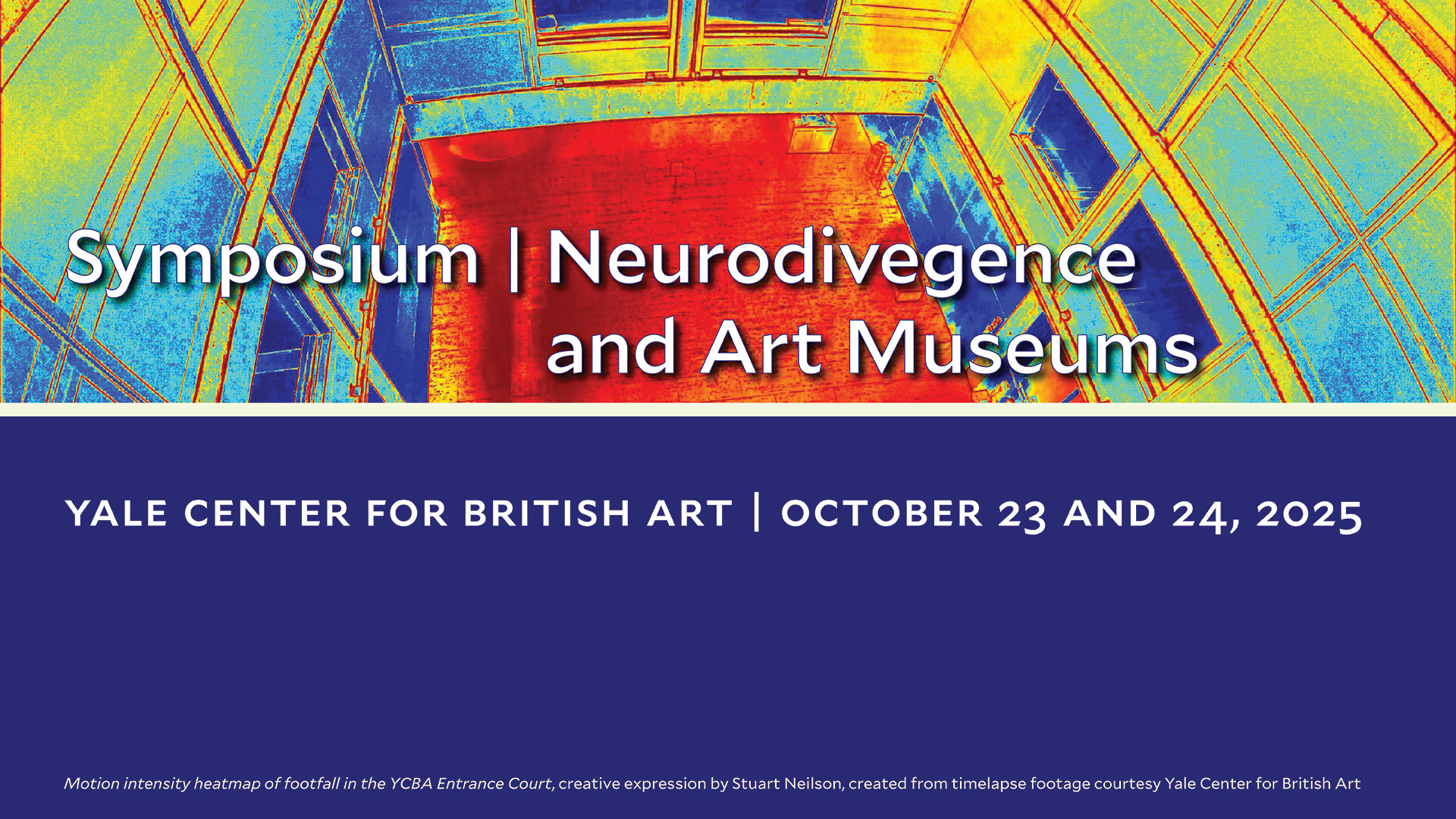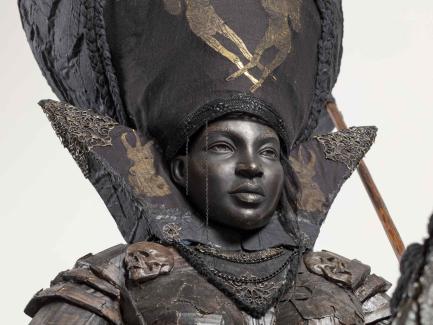In recent years, art museums have increasingly focused on offering experiences of learning, socialization, and self-determination to all visitors, including those who are neurodivergent. As repositories of the visual arts, art museums have great potential to engage neurodivergent visitors through the richness and complexity of their collections. However, museums often unwittingly maintain barriers to access. Tension continues to exist between the traditional role of museums as institutions dedicated to the preservation of collections and their role as spaces in which that collection is available to a diverse public.
The goal of empowering neurodivergent people to visit museums on their own terms is a multidisciplinary effort, often relying on input from the fields of medicine, public health, architecture, engineering, design, and museum education. This symposium, “Neurodivergence and Art Museums,” brings together voices from these fields to discuss recent developments in the accessibility and ease of experiencing cultural spaces and future possibilities for the inclusion of neurodivergent audiences.
One of the symposium’s guiding questions will be: How can we imagine art museums as public spaces that embrace and engage individuals with a diverse range of neuro-abilities, and create opportunities for dialogue, connection, and innovation? Panelists will address the process of creating neuro-inclusive environments from the experience of neurodivergence; audiences for neuro-inclusive design; and the ways in which neurodivergent visitors can discover, navigate, and make use of these environments. These cross-disciplinary discussions will explore how different fields engage and embrace neurodivergent visitors and consider how art museums can look to interdisciplinary solutions to open their spaces to the neurodivergent community.
In addition to the programming, First Place–Phoenix, a residential community school in Phoenix, AZ, is supporting exhibitions of art by keynote speaker Stuart Neilson at New Alliance Foundation Art Gallery at CT State Gateway and at Chapel Haven Schleifer Center, a residential school in New Haven for adults with social and cognitive disabilities, from October 23 through November 7, 2025.
Register
Schedule
Download a PDF of the schedule.
Thursday, October 23, 2025
5:30–6:30 pm
Keynote Conversation: Neurodivergence and the Art Museum
Stuart Neilson, PhD, in conversation with Justin Berry, Creative Producer / Project Director, XRPeds Lab, The Yale Center for Immersive Technologies in Pediatrics
As a writer, image-maker, and lecturer in statistics, Stuart Neilson uses his personal experience as an individual with an autism diagnosis to map barriers to access in museums. His keynote will explore how neurodivergent people experience place and space within art museums, as well as how we might advance our understanding of those experiences and address the needs of neurodivergent people in art museums. Using heat-map and stop-motion photography, his photographs visualize the movement within and transitions between spaces in museums, exhibitions, and galleries, and the circulation around them, including the urban streetscape. He is particularly interested in how photography can draw attention to the transitions between spaces and to barriers to access, such as anxiety about entrances, to showcase how “unremarkable” spaces can be difficult for neurodivergent individuals to access.
Friday, October 24, 2025
10:30–10:40 am
Welcome and Opening Remarks
Hannah Kinney, Head of Education, YCBA
10:40–11 am
Introduction
Linda Friedlaender, Senior Educator for Engagement and Outreach, YCBA
11 am – 12 pm
Session 1: What is Neurodivergent Museum Education?
Moderator: Jessica Sack, Jan and Frederick Mayer Curator of Public Education, Yale University Art Gallery
In this session, speakers will examine how art museums can foster diverse ways for neurodivergent visitors to think and express themselves. The museum educators in this session will describe programs that support sensory exploration, personal connection, and creative response. Panelists will explore collaborative, inclusive approaches that build on the strengths of neurodivergent visitors to promote learning, self-expression, and identity formation. Topics of discussion will include how the arts can support skill development and amplify joy in neurodivergent visitors; how to leverage community and academic partners to support our endeavors; and why inclusion matters in museum education.
Discussants:
Jennifer Kowitt, Associate Professor of Special Education, University of Saint Joseph
Kimaada Le Gendre, Chief Learning Officer and Director of The Suna Children’s Museum, Queens Museum
Rebecca McGinnis, Accessibility Consultant
12–1:30 pm
Lunch Break
Lunch on your own
1:30–2:30 pm
Session 2: Creative Confrontations with Space
Moderator: James McPartland, Harris Professor of Child Psychiatry and Psychology, Yale Child Study Center; Director, Yale Developmental Disabilities Clinic; Director, Yale Center for Brain and Mind Health
This session will consider how the built environment in public spaces, specifically in art museums, can meet the needs of the neurodivergent population. Experts from the arts and sciences will explore the ways in which cross-disciplinary engagement can broaden understanding of how neurodivergent people experience place and space in the context of museums and galleries. Speakers will discuss the influence of architecture on behavior in museum environments and how inclusion can shape the design of exhibition and gallery spaces.
Discussants:
Sean Ahlquist, Director of the Master of Science in Digital Material Technologies, Associate Professor of Architecture, University of Michigan
Valerie Fletcher, Executive Director, Institute for Human Centered Design
Elihu Rubin, Henry Hart Rice Associate Professor of Architecture and Urban Studies, Yale
School of Architecture
2:30–2:45 pm
Break
2:45–3:45 pm
Session 3: Redefining the Art Museum’s Interior Spaces: An Ethical Commitment to Justice, Design, and Access
Moderator: Meghan Crnic, Assistant Professor of Family Medicine and Associate Director, Edward D. Viner Center for Humanism, Cooper Medical School of Rowan University
In this session, speakers will take part in a cross-disciplinary discussion intended to advance understanding and generate actionable improvements to accessibility and design in art museums for neurodivergent individuals. The panel will consider how adaptations have been made in other fields, including environmental studies, bioethics, design, history, and the performing arts, to address the needs of neurodivergent individuals. By considering perspectives from a range of fields and disciplines, art museums can apply insights and tools from these fields to enhance experiences for neurodivergent individuals, particularly in terms of accessing, moving through, and feeling comfortable in different spaces. Speakers will explore how we can look to interdisciplinary solutions in addressing these needs and instituting meaningful change in art museums.
Discussants:
Laura Nadine, Program Director of Studio Laura Nadine, professional violinist, and composer
Sarah Rottenberg, Adjunct Assistant Professor in the Weitzman School of Design, Executive Director of the Integrated Product Design Program, and Faculty Director of the Executive Program for Social Innovation Design, University of Pennsylvania
Eron Friedlaender, MD, MPH, Professor of Clinical Pediatrics at the University of Pennsylvania Perelman School of Medicine and Attending Physician in the Emergency Department at the Children’s Hospital of Philadelphia
3:45–4 pm
Concluding Remarks
Matthew Capezzuto, Educator, K-8, Family, and Access Programs, YCBA




